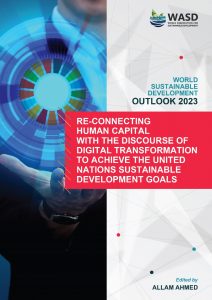The Role of Capital Development Authority, Dhaka, Bangladesh: From Sustainable Development Goals to Action, Mohammad Hoque
 Mohammad Samsul Hoque
Mohammad Samsul Hoque
Deputy Secretary, GoB; Director, Rajdhani Unnayan Kartripakkha (RAJUK)
Dhaka, Bangladesh
Email: hoque_ict112@yahoo.com
Paper Type: Research Paper
Received: 27 June 2023 / Revised: 14 October 2023 / Accepted: 15 October 2023 / Published: 30 December 2023
DOI: 10.47556/B.OUTLOOK2023.19.12
Abstract
Attaining membership in a Bangladesh middle-income country club is a momentous achievement that has garnered international recognition since the country’s independence. This milestone reaffirms the nation’s sovereignty and signifies its financial autonomy and independence. However, elevation to middle-income status should not overshadow future challenges. Experts in the field have raised concerns that Bangladesh may become entrapped in the cycle of middle-income status, thereby impeding further advancement towards achieving developed-country status. To progress, the nation must formulate a comprehensive plan to attain developed country status by 2041.
Purpose: Housing is considered a fundamental right for citizens in Bangladesh as per its constitution; however, a significant population in the capital city of Dhaka lives in overcrowded slums or lacks basic shelter altogether (Khasru et al., 2019). The SDGs recognise the need for inclusive, safe, resilient, and sustainable cities for human settlements, particularly for the 1 billion slum dwellers worldwide, who often lack access to public transportation and suffer from poor air quality and solid waste problems. Many countries are implementing various projects to address these issues and meet the SDGs. Bangladesh is one of the few countries to implement the SDGs by the UN, achieving significant indicators even during and after the COVID pandemic; this was due to timely and systemic steps by the government and civil society organisations (CSOs). The primary objective of this paper is to examine the role of Rajdhani Unnayan Kartripakkha (RAJUK) in promoting sustainable housing and its efforts in implementing sustainable housing practices within a city of 20 million people as a regulatory authority aligned with the SDGs.
Design/Methodology/Approach: This study uses primary and secondary data to focus on sustainable housing conditions in Bangladesh’s capital city. The study will employ secondary data collection methods such as a literature survey, government document analysis, and archive exploration. To determine the role of the regulatory authority, the study will employ primary data collection methods such as semi-structured interviews with stakeholders. Furthermore, the secondary literature review will determine the regulatory authority’s limitations in ensuring sustainable housing in Dhaka, Bangladesh. By employing such methods, the study will propose policy recommendations for better working conditions and improvements in service delivery by Bangladesh regulatory authorities.
Findings: To provide sustainable housing and implement SDG 11, various government agencies and CSOs work together in Dhaka. The Capital Development Authority (CDA), also known as Rajdhani Unnayan Kartripakkha (RAJUK), is the top organisation that makes policies and decisions to ensure the capital is sustainably inhabitable for current and future generations. However, the failure to collaborate with other government agencies, local government organisations, CSOs, and individual landowners has prevented RAJUK from implementing its significant policies, including the Detailed Area Plan (DAP) for Dhaka (Ranjbari et al., 2021). To address the housing crisis and implement SDG 11 in Dhaka, it is essential to develop sustainable solutions. First, the government must ensure that policies are implemented collaboratively with all stakeholders. Second, it is crucial to incorporate affordable and eco-friendly housing designs, energy-efficient building materials, and proper waste management practices (Haque et al., 2022). Third, sustainable transportation options, such as mass rapid transit systems and bike-sharing programmes, must be developed. Fourth, the government must promote public awareness and community engagement through education campaigns and community-based approaches. Finally, partnerships with CSOs can help ensure the involvement of marginalised and vulnerable populations.
Keywords: Housing; SDGs; Sustainable Housing; Detailed Area Plan; Liveable City.
Citation: Hoque, M.S. (2023) “Sustainable Housing and the Role of Regulatory Authority: A Case of Dhaka, Bangladesh”, in World Sustainable Development Outlook 2023, Vol. 19, pp. 183–202 (London, UK: WASD).

